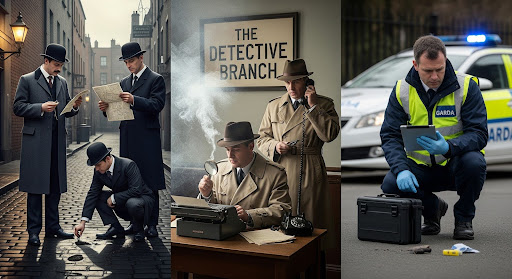The story of detective policing in Ireland begins before the establishment of An Garda Síochána. During British rule, the Dublin Metropolitan Police (DMP) established its own detective unit in 1842, known as the ‘G Division’. This specialist unit was responsible for political surveillance and criminal investigation in the capital.
When the Irish Free State was established in 1922, and with it An Garda Síochána, there was initially no formal detective branch. The early force focused on establishing itself as a civilian police service that could gain the trust of the Irish people after years of colonial policing.
The Birth of the Detective Branch
By 1925, it became clear that a specialist investigative unit was needed. The Detective Branch (Special Branch) was formally established with a dual mandate: to investigate serious crime and to protect the security of the state during those turbulent early years.
The Branch was initially small, with detectives working in plain clothes and focusing on political crimes and threats to state security. They operated with minimal resources but quickly developed expertise in intelligence gathering and investigation.
Mid-Century Developments
The 1950s and 60s saw significant modernisation of detective work in Ireland. The Detective Branch expanded its focus beyond political crimes to tackle the growing challenges of organised crime. This period saw the introduction of more scientific methods of investigation, though still rudimentary by today’s standards.
The Bureau of Criminal Investigation was established in 1971, marking a significant milestone in the development of detective work. This specialised unit was created to coordinate investigations into serious crimes and to develop expertise in areas such as forensics, fingerprinting, and ballistics.
Modern Transformation
The most dramatic evolution came in the late 20th century. The 1980s and 90s saw Ireland facing new criminal challenges, including drug trafficking, armed robbery, and eventually, cybercrime. In response, Garda detective capabilities underwent a significant transformation.
The establishment of the National Bureau of Criminal Investigation (NBCI) in 1997 represented a major leap forward. This elite unit centralised the investigation of serious crimes, bringing together specialised detectives with expertise in various fields.
Simultaneously, technological advances revolutionised detective work. DNA profiling, digital forensics, CCTV analysis, and advanced database systems became essential tools for Irish detectives. The Computer Crime Investigation Unit, established in 1991, was one of the first police cybercrime units in Europe.
Specialised Units
Today’s Garda detective service comprises numerous specialised units:
- The Special Detective Unit (SDU) – focused on threats to state security
- The National Bureau of Criminal Investigation (NBCI) – investigating serious and organised crime
- The Garda National Economic Crime Bureau – tackling fraud and financial crimes
- The Garda National Drugs and Organised Crime Bureau – combating drug trafficking
- The Garda National Cyber Crime Bureau – investigating cybercrime
Training and Expertise
Modern Garda detectives undergo rigorous, specialised training. From basic detective training to advanced courses in interrogation techniques, crime scene management, and financial investigation, today’s detectives are highly skilled professionals.
International cooperation has also become central to detective work. Irish detectives regularly work with Europol, Interpol, and police forces worldwide to tackle transnational crime networks.
Challenges and Controversies
The history of detective policing in Ireland has not been without its controversies. The Heavy Gang allegations of the 1970s, the Kerry Babies case, and more recent concerns about the handling of certain investigations have prompted important reforms in detective procedures.
Each controversy has led to greater accountability, improved training, and more robust oversight. The establishment of the Garda Síochána Ombudsman Commission in 2007 was a significant step toward ensuring proper investigation standards.
Looking Ahead
As we look to the future, Irish detective policing continues to evolve. Emerging technologies like artificial intelligence, advanced data analytics, and new forensic techniques are changing how investigations are conducted.
The challenges are also evolving. Cybercrime, transnational organised crime, and terrorism require increasingly sophisticated detective responses. Yet the core principles remain the same as they were in 1925 – careful investigation, attention to detail, and a commitment to justice.
From the early days of the Special Branch to today’s highly specialised detective units, the story of detective policing in Ireland reflects our nation’s journey. It’s a story of adaptation, professionalisation, and an unwavering commitment to protecting the Irish people and bringing offenders to justice.
Written by Sean Daly Garda

